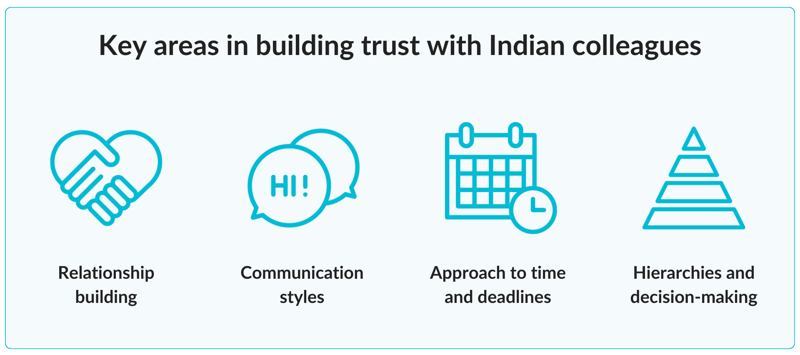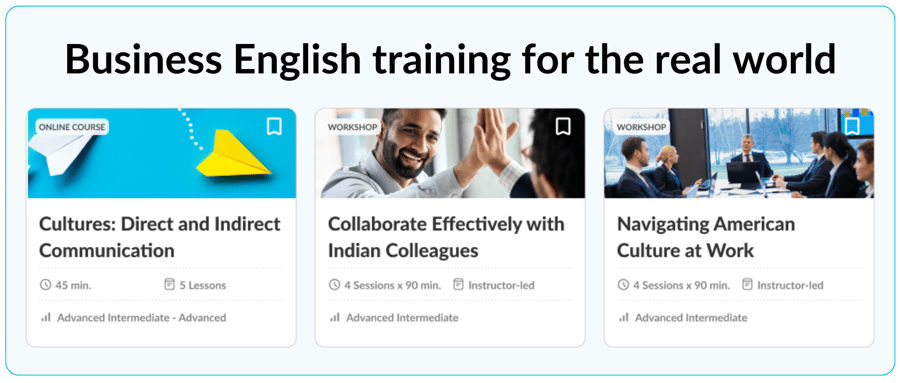By Paola Pascual on Jan 30, 2024 11:32:17 AM
Whether you're a seasoned professional steering multinational projects, a manager overseeing cross-border teams, or an individual keen on enhancing your cultural competence, this article is crafted to guide you through the unique cultural landscape of multicultural workplaces.
By the end of this article, you'll be equipped with practical strategies for building relationships with colleagues based in India, turning cultural diversity into a powerful asset for global business, and helping you increase your cultural intelligence.
|
Table of contents: |
Importance of cross-cultural communication skills
“Instead of dwelling on the differences, embrace the similarities and find common ground. That is where truly successful collaboration happens.”
Before we dive deeper, let's understand why strong cross-cultural communication skills are so important in global business, especially when working with diverse teams like in India. Cross-Cultural Communication is the key that unlocks effective collaboration across cultures. Understanding cultural nuances means more than just avoiding misunderstandings; it's about leveraging the unique aspects of Indian professional dynamics to build trust, break down language barriers, prevent silos in the workplace, and ultimately increase productivity.
The approach in this introduction to relationship building with Indian colleagues is not about viewing differences as barriers but as opportunities for effective and empathetic collaboration. Indian professionals in IT and global business sectors are known for their adaptability and awareness – they will likely be highly aware of the location of their colleagues and have some knowledge about their customs and traditions.
Recognizing and adapting to different communication styles, hierarchical perspectives, and time management approaches are key to achieving mutual respect and productive collaborations. Sometimes, it is about understanding that those differences are not that stark and that in certain industries and among newer generations, we may be more similar than what traditional stereotypes may suggest.
These skills are not just beneficial in the immediate context of working with Indian colleagues but are transferable assets in any multicultural workplace setting.
Understanding India's diverse cultural landscape
India is a major player in the IT and global business sectors, and not just because multinational companies like Adobe, Google, Microsoft, or IBM have Indian CEOs. With almost 3 million Indians living in the United States and India being the largest exporter of IT in the contemporary world economy, it is likely for many professionals worldwide to work with Indian colleagues at some point in their careers. Home to over 1.4 billion people, India is a nation where diversity is a way of life. This diversity is not only evident in its cultural fabric but also in its business practices. With over 20 officially recognized languages, India's multilingual environment adds a unique dimension to its workplace, where communication styles can vary greatly across different regions.

At the heart of Indian culture lie values and norms that significantly influence business practices. Relationships and trust form the cornerstone of professional interactions. Building strong, personal connections is often seen as a precursor to successful business dealings. Decisions and approvals often flow from the top, emphasizing the need for respecting and understanding the organizational structure. Respect for hierarchy and seniority is another fundamental aspect of traditional Indian workplace culture.
Indians often place a high value on adaptability and flexibility, viewing them as essential traits for success in the ever-changing business landscape. This approach often leads to a more holistic decision-making process, albeit sometimes at a slower pace. Patience and a willingness to adapt to this fluidity can go a long way in fostering harmonious and productive business relationships.
However, things are changing in the global business culture, also among Indian workers. We are experiencing a paradigm shift, where employees are becoming more vocal at work, where hierarchies are flattening, and where things happen at a faster pace. This is partly due to generational differences, globalization, and the agile mentality typical of the tech sector.
Professionals from the United States and other Western countries often find these differences intriguing and enriching, though they can sometimes lead to communication challenges. These challenges, though, are not about one way of working being right or wrong, but rather about embracing and adapting to diverse work cultures and communication styles. Understanding and respecting these differences can lead to more effective collaboration and can prevent potential misunderstandings, ensuring successful outcomes in this interconnected global business environment.
In understanding these cultural layers, one begins to appreciate the complexity and richness of the Indian workplace. It's a place where tradition meets modernity, where diverse languages and customs converge to create a dynamic and vibrant business environment. As we delve deeper into specific aspects of communication, values, and etiquette in the following sections, keep in mind this diverse cultural landscape, which forms the backdrop of every interaction in the Indian workplace.
Let’s look at four major key areas, relevant in building trust with Indian teams. Then, you will get specific strategies and tips for each of the areas.

A. The importance of relationships in Indian business
Relationships and trust form the cornerstone of business in India. Contrasting with the more transactional and short-term nature of many Western business interactions, Indian business culture highly values the cultivation of long-term relationships. Initially, Indians may appear reserved, particularly with non-Indians, as they take time to establish trust and familiarity.
The process of nurturing these relationships often involves personal interactions, understanding family backgrounds, and investing time in knowing business partners beyond just professional settings. Networking and relationship-building in India go beyond expanding business opportunities; they are about laying a foundation of trust and mutual understanding. Frequently, Indian businesspeople show a preference for working with those they know well and trust.
Socializing in India tends to be personal and informal. Friends are often treated like family, with personal information being openly shared. Business in India encompasses not just shared professional interests but also extends to family, personal life, and other mutual interests.
Eager to go straight to the strategies? Click here.
B. Communication styles among Indians at work
Navigating the intricacies of communication in Indian workplaces is a journey into a world where both spoken and unspoken languages play crucial roles. Let’s take a closer look at these nuances.
Verbal communication in India
Communication in India, especially verbal communication, often has multiple layers of meaning, shaped significantly by the context and the relationship between the speakers (generally speaking, India is a high-context culture). Typically, people in India prefer indirect communication in professional settings, focusing on maintaining harmony and respect.
Don’t take me wrong. They will voice their opinion and they can sound direct and assertive. However, they often prefer to avoid saying “no” openly. Instead of “no”, you might hear "We'll see," or "Yes, but it may be difficult." These phrases often imply hesitation or refusal, a concept that might be confusing for those accustomed to more assertive communication.
Nonetheless, this preference for indirect communication is also evolving. With just three “golden hours” overlapping between teams based in India and the United States and often a short time window to get all your questions answered, there is no time to beat around the bush. Indirect signals are also better perceived in person, but with an increasing amount of workers collaborating remotely, direct communication is rising as the preferred style in today’s global business, also in Indian workplaces with international teams.
The way "yes" is used in Indian communication can be especially challenging for outsiders. Often, "yes" means someone is just acknowledging they've heard and understood you, not necessarily that they agree or commit to something. Ensure you are on the same page by checking their understanding and asking follow-up questions.
Non-verbal cues in India
“Saying a straightforward ‘no’ is difficult for most Indians, but looking away is an indicator that they may not be interested.” – Neeraja, Learning Specialist from India
Non-verbal communication in Indian workplaces can be just as nuanced as verbal interactions. Gestures, body language, and facial expressions carry significant weight in conveying messages. However, the use of technology, the size of the group, and the context can make speakers more or less dependent on nonverbal cues.
Watch out for the popular Indian head nod. Don’t make assumptions and clarify if you are unsure.
Eye contact is another area where cultural nuances come into play. Maintaining direct eye contact is less common in India than in many Western countries, especially in interactions between different genders or with someone in a higher position of authority. Newer generations, on the other hand, will likely feel more comfortable maintaining direct eye contact.
Physical contact and personal space also vary across different regions and individual preferences. A safe approach in professional settings is to observe and mirror the physical boundaries maintained by your Indian counterparts.
|
💡 Recap: In Indian culture, there's a strong emphasis on keeping harmony and positive relationships. This means that some people in India prefer to communicate in ways that avoid any kind of conflict or discomfort. The idea is to maintain a peaceful and respectful atmosphere in all conversations. |
C. Navigating time and punctuality in the Indian workplace
The approach to time and deadlines in the Indian workplace can feel like a different experience for those accustomed to Western time management norms.
In many Western cultures, time is usually perceived as linear, with a beginning and end. Time is a limited resource that must be carefully managed, and missing deadlines can be interpreted as a lack of professionalism or competency. In some Eastern cultures, such as India, time is often perceived in a more flexible way. Whenever possible, maintaining harmony and doing things right is more important than strictly adhering to deadlines. In this context, deadlines are seen as 'targets' or 'goals', not as rigid, unchangeable points in time. Erin Meyer’s Culture Map is an excellent book to expand your knowledge on this concept. Again, in international business situations and in agile teams, there is a much stricter adherence to timekeeping.
Indian professionals often handle multiple tasks and responsibilities at once. The prioritization of these tasks can be fluid and influenced by factors such as urgency, importance, or available resources. As a result, deadlines may be adjusted based on shifting priorities and the need to balance different responsibilities. When deciding how to prioritize tasks and meet deadlines, Indian professionals might consider the impact of a delay on their relationships with colleagues, clients, or superiors. If a delay in one task could negatively affect an important professional relationship, that task might be given higher priority, even if it means rescheduling other deadlines. This means that while the goal is always to complete work on time, you might not receive early heads-up if things are running behind schedule. You will find ways to overcome this in the advice section below.
While many local Indian companies may adopt a more relaxed approach to timekeeping and deadlines, employees in multinational companies are expected to adhere to strict schedules.
However, this does not mean that your Indian colleagues will arrive late to meetings. They will typically be punctual for scheduled appointments, recognizing the value of time in international business contexts.
|
💡 Recap: Building trust and rapport with others may be more important than punctuality in some contexts. Relationships often take priority over deadlines and schedules. Being adaptable and capable of handling changes as they arise are considered essential skills in the Indian professional environment. |
D. The role of hierarchies in Indian business culture
In India, business culture traditionally values hierarchy and respects authority. This approach is rooted in historical traditions and societal norms. Typically, in Indian companies, leaders at the top make decisions, and their authority is highly respected. This hierarchical structure influences many business practices, such as communication, task assignment, and conflict resolution. Generally, employees might not openly challenge their managers or disagree with higher-ups.
However, this is not the case for everyone. Younger generations and IT teams are shifting this trend. They are adopting a more open and flexible approach, with less emphasis on strict hierarchy. These groups are increasingly embracing flatter organizational structures, encouraging open communication, and challenging traditional norms
|
💡 Recap: In Indian business culture, respect for hierarchy and seniority is important. This respect leads employees to avoid openly challenging their superiors, as it's seen as disrespectful. Instead, they often prefer indirect communication, valuing a harmonious and respectful professional environment over direct confrontation. Nonetheless, in multinational companies and among younger generations, hierarchies are becoming flatter. |
In summary, navigating Indian workplaces successfully, understanding hierarchies, and building relationships require a blend of respect, patience, and adaptability. Now, let’s look at specific strategies to build trust with Indian teams and, ultimately, streamline collaboration.
Strategies to build trust with Indian teams
Before diving into specific tips and strategies for building trust with Indian teams, remember a foundational guideline for cross-cultural interactions: if you are unsure, it's perfectly okay to ask. Openness to learning and understanding is a key step in bridging cultural gaps and fostering strong connections. Now, let's explore various areas where you can apply this approach effectively.
1. Building relationships with Indian colleagues
“We tend to be quite casual with each other. Typical small talk questions include “How long have you been married?” “Who do you live with?” or “Do you have kids?” but we don’t ask about money.” – Systems Engineer from India working at multinational company
Fostering strong relationships is a key aspect of Indian culture. Here are key strategies to develop deeper connections with your Indian colleagues.
🔹 Embrace cultural and personal discussions: In India, professional and personal spheres often intersect. Engage in conversations that span beyond work, exploring topics like food, art, music, and festivals alongside family. These discussions, rooted in the three Fs - Food, Family, and Festivals - are not just small talk but pathways to trust and understanding.
🔹Acknowledge and celebrate diverse cultural elements: Showing genuine interest in Indian festivals, traditional arts, and significant days is a respectful nod to the culture. One of the experts we interviewed highlighted an interesting cultural exchange initiative: "Days that Matter". In this program, participants spend a few minutes sharing about important days in their cultures, such as Diwali, Christmas, Independence Day, or Hannukah. This proved to be a successful initiative to foster mutual understanding and respect.
🔹 Participate in cultural and social activities: Immerse yourself in the rich cultural fabric of India. Join in informal gatherings, celebrations, and virtual coffee breaks where you can discuss non-work-related topics, ranging from popular Indian arts to local holidays. Wearing Indian ethnic attire during festivals, even virtually, demonstrates respect and interest in the culture.
🔹 Enjoy extended business lunches: These are opportunities to know your colleagues beyond their job titles. They're a mix of personal and professional discussions, often starting with casual topics before delving into business matters.
🔹 Participate in extended business lunches: Business lunches in India are about more than just work. These are opportunities to know your colleagues beyond their job titles. These lunches offer a relaxed and meaningful way to connect, often involving wide-ranging discussions before focusing on business.
🔹 Pronounce names with care: Show respect and attentiveness by learning the correct pronunciation of your colleagues' names. It’s okay to ask for clarification and jot it down for future reference. One of the experts we interviewed stated how simple yet extremely impactful this tip is as a way to show respect and build relationships.
🔹 Understand the importance of family and backgrounds: Conversations about hometowns, families, and cultural practices are typical in business meetings, helping to build personal connections.
🔹 Understand the importance of family and backgrounds: Conversations about hometowns, families, and cultural practices are typical in business meetings, helping to build personal connections.
🔹 Be observant and adaptive: Pay close attention to social cues and adapt your behavior accordingly. Observing how your Indian colleagues interact can offer valuable insights into appropriate behaviors and practices in their business environment.
2. Effective communication with Indian colleagues
“Consider who you are communicating with, how much they know about the topic, what they value most, and where they are in their journey. Make it less about what you want to say and more about how your listener may perceive the information.” – Manager and Corporate Communications from India
Effective communication is fundamental in building trust with Indian teams. Adapting to varying communication styles requires a blend of observation, patience, and a willingness to learn. Here are some key strategies:
🔹 Understand your audience: Assess who you are communicating with, their knowledge level on the topic, what they value, and their experience level. Focus on how your message will be perceived rather than just what you want to say. This perspective emphasizes empathy in communication.
🔹 Listen for context: Communication in India often involves understanding the unsaid. Pay close attention to non-verbal cues and the broader context, as they can offer insights into the intended message.
🔹 Clarify and confirm: Ensure mutual understanding by confirming your interpretation of discussions. Ask open-ended questions to encourage comprehensive responses and avoid misunderstandings.
🔹 Respect the pace: Remember that decision-making may be slower due to an indirect communication style and a focus on relationship-building and consensus. But also don’t be surprised if your Indian colleagues are as agile as any other international colleague.
🔹 Embrace flexibility: Adaptability in both communication and expectations is key. Adjust your approach based on the feedback and signals from your Indian colleagues.
🔹 Engage in cultural learning: Participate in cross-cultural workshops or training sessions, on your own or -even better- together with your Indian counterparts. These activities offer deeper insights into Indian communication styles and business etiquette, aiding in bridging cultural gaps and enhancing team cohesion.
As you grow more accustomed to these nuances, your interactions will become more effective, and your relationships with Indian colleagues will strengthen.
3. Managing time and punctuality with Indian teams
Time management and punctuality are approached differently in India. Here’s how to adapt:
🔹 Set realistic timelines: Factor in the flexible approach to time. Allow buffer periods for unforeseen delays. Phrasing like “I understand that sometimes things take a bit longer than anticipated, so let's try to set a realistic deadline” can be more effective than imposing strict timelines.
🔹 Communicate priorities clearly: Clearly discuss the importance of deadlines and how they contribute to the project's success.
🔹 Establish regular check-ins: Schedule frequent progress reviews to keep everyone aligned on the project’s status and any shifts in timelines or priorities.
🔹 Understand local holidays and working hours: Be mindful of Indian holidays and their impact on work schedules. Understanding these can help in planning and setting realistic timelines. Use the Timeanddate website to see upcoming Indian national and regional holidays.
🔹 Use time management tools: Employing project management tools that allow for clear visualization of deadlines and progress can help bridge different approaches to time management.
🔹 Emphasize mutual goals: Focus discussions on the shared goals and outcomes of the project. Highlighting the mutual benefits of adhering to timelines can foster a collaborative approach to meeting deadlines.
Overall, adaptability and understanding can go a long way in maintaining smooth working relationships and ensuring project success.
4. Navigating hierarchies in Indian workplaces
“Although titles are important in India, most multinational companies (MNC) use first names, regardless of the rank within the company.” – Manager and Corporate Communications from India
Hierarchical structures are prominent in Indian workplaces, and this aspect may also be perceived among some Indian colleagues working in multinational companies. To navigate this:
🔹 Respect seniority: Show deference to senior figures. If you are unsure, start meetings by inviting the most senior member to provide opening remarks or set the agenda, even if it's just a brief introduction. When attending a meeting, always address the highest-ranking individual first, using their proper title (e.g., “Dr. Sharma” or “Mr. Gupta”). Job titles are important for people in India – use them correctly during introductions. If you're presenting an idea, direct your initial comments and eye contact towards them as a sign of respect.
🔹 Understand the decision process: Acknowledge that decisions may take longer as they often need approval from various levels of authority, so factor this into your planning and timelines.
🔹 Adapt your communication style: Be formal and respectful with senior staff, and more collaborative and inclusive with peers and junior members.
🔹 Be consistently explicit and welcoming as a manager: If you are managing a team with individual contributors from India, consistently practice explicit communication paired with a welcoming tone. Statements like, "If you have any questions, please speak up, or you can send me an email if you prefer. I am here to help. There are no bad questions” can help you foster a comfortable environment where team members feel like they can speak up and be transparent.
Conclusion
Building trust in the Indian workplace involves much more than understanding different work practices; it’s about understanding cultural values and adapting with respect. These insights and strategies will not only make you a more culturally sensitive and globally competent professional but also a more efficient one.
Embrace the differences and leverage similarities. See every interaction as an opportunity to deepen your understanding of Indian culture and refine your approach. And, always, continue to learn and stay open to new ways of doing things.
If you are interested in delving deeper and sharpening your skills in business English and cultural understanding, Talaera offers a range of tailored training solutions. Our expert-led workshops and self-study programs can provide you and your team with the tools and knowledge to navigate the complexities of multicultural workplaces effectively.
Whether you're looking to help your team improve communication with Indian teams or broaden your global business perspective, Talaera can support you.
Keep learning
Talaera's business English and culture training can play a pivotal role in enhancing communication skills and cultural competence, empowering you and your team to thrive in any global work environment.

Keep reading:
- 10 Effective Ways to Increase Your Cultural Intelligence (CQ)
- A Quick Guide To Asking Better Questions In Cross Cultural Workplaces
- 7 Tips On How To Communicate Better With US Americans [Podcast]
- What Americans Really Mean When They Say Things Like “How Are You?”
- 9 Signs of Cross-Cultural Communication Challenges in Your Team
- How To Overcome The Top 4 Communication Barriers In The Workplace
- Cross-Cultural Communication





comments